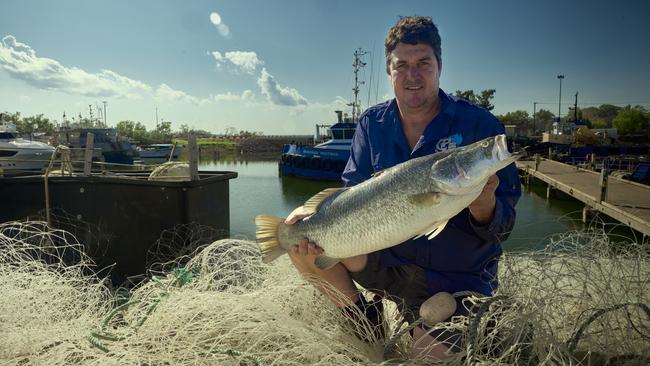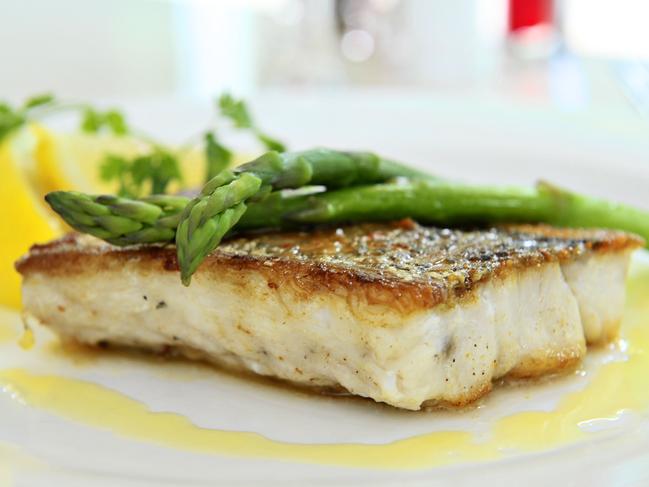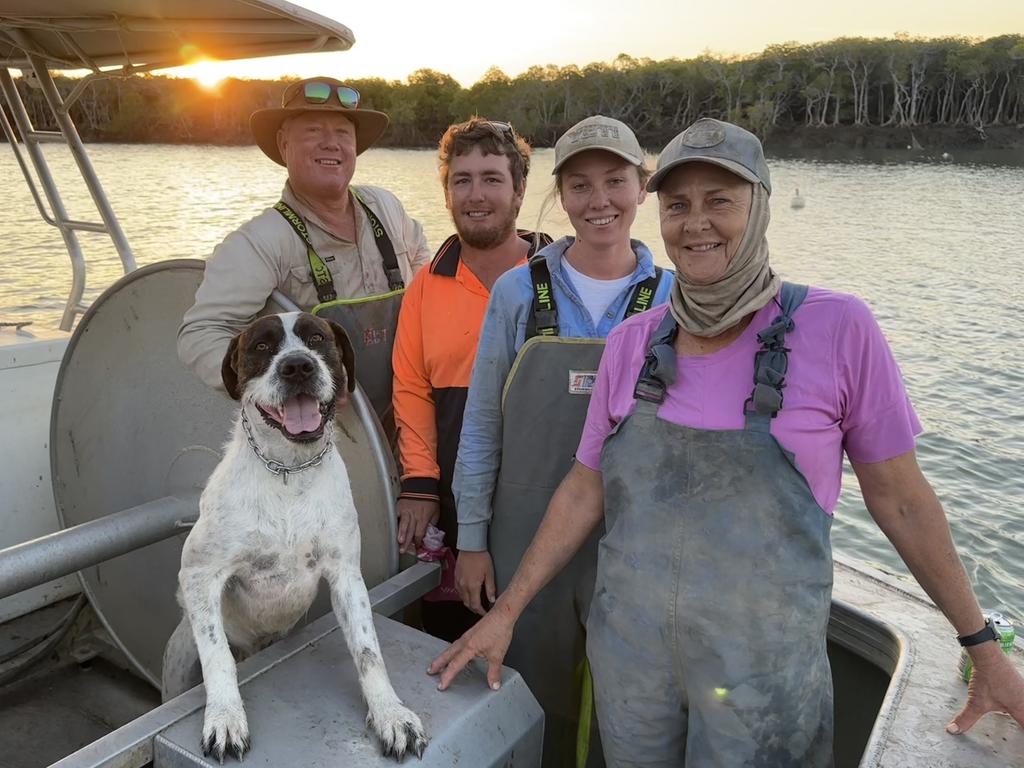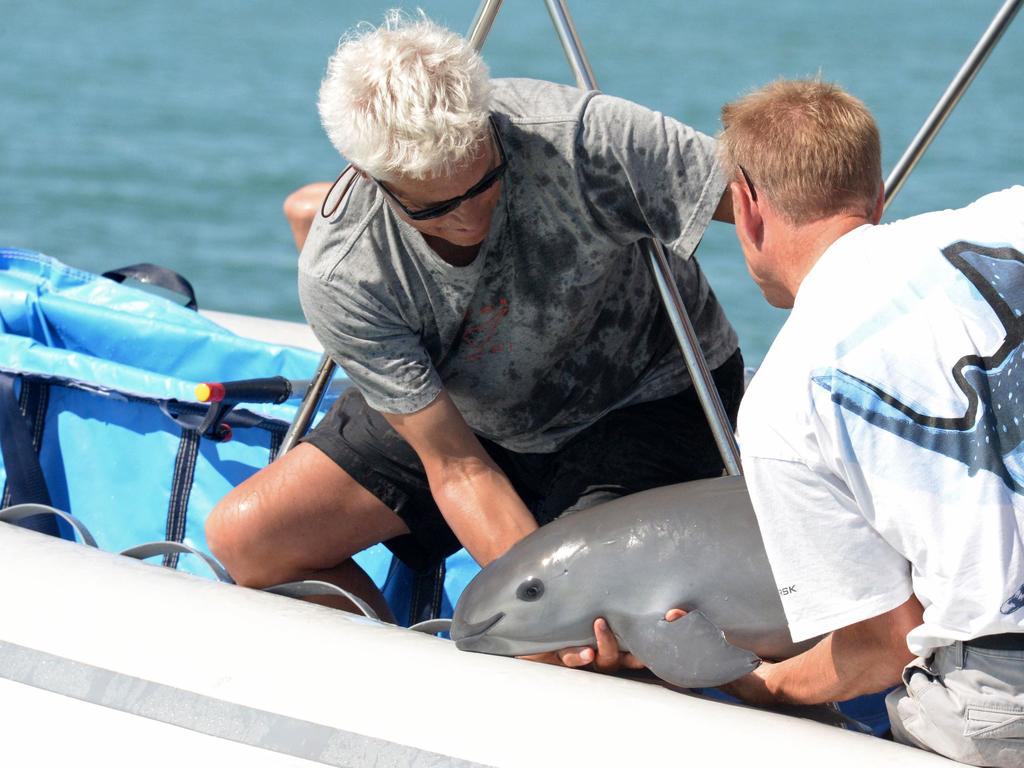Great barra grief: fishers warn net ban will drastically scale back their catch
It’s a national dish as iconic as a meat pie and lamingtons, but wild caught barramundi could become a rarity as government regulations tighten the net on northern Australia’s commercial fishing industry.

It’s a national dish as iconic as a meat pie and lamingtons, but wild caught barramundi could become a rarity as government regulations tighten the net on northern Australia’s commercial fishing industry.
Governments in Queensland and the Northern Territory, where most of Australia’s wild catch barramundi comes from, have announced crackdowns on the use of gillnets, the primary method used to catch tradeable quantities of the fish.
Already, the restrictions have reduced Queensland’s east coast barramundi catch by almost half, The Weekend Australian can reveal.
Both major parties in the Northern Territory have pledged to ban the long rectangular nets, which entangle fish by their gills or spikes, if they win government at next month’s election.
The pending ban has pitted the NT’s large population of recreational anglers against the commercial sector, which says its ability to supply affordable wild barramundi and king threadfin salmon is at risk.
Northern Territory Seafood Council chief executive Daniel Capps said the ban was not based on scientific evidence or economic impact assessments, and the $15m pledged by Labor to buy back gillnet licences in the NT was far from enough to help the industry transition.
“If the gillnet ban comes into effect, there is likely to be a very limited supply of wild caught barra,” Mr Capps said.
“Politicians are talking about re-imagining the fishery and using alternative methodologies and types of gear, but the problem is that the only alternative type of gear is line fishing and that isn’t commercially sustainable under the current circumstances.”

Wild Barra Fisheries director Cameron Berryman, whose licences cover about 70 per cent of the NT barramundi fishery, said there were currently no other viable methods of catching the fish at a commercial scale.
He said that without government funding to test and implement alternative fishing techniques, the ready supply of wild barramundi would be put at risk.
“If there’s plenty of funding available and the ability to transition and a time frame to transition, I don’t think it’ll affect it too much,” he said.
“But if it’s sudden, and they just rip the band aid off, I think it’d be hard to come by and what is available will be highly expensive.”
Government surveys indicate barramundi are fished at a sustainable rate, but gillnet opponents say the nets affect the safety of threatened, endangered and protected bycatch species, including turtles, dugongs and sawfish.
The industry strives to limit bycatch and must record incidents in logbooks that are sent to regulators. Recently, some boats in the NT and Queensland have been equipped with cameras to verify logbook entries.
Mr Berryman said bycatch was rare, and with nets being monitored by crew, at-risk bycatch species were released, sometimes after being tagged to provide data for scientists.
Darwin-based Wild Barra fleet manager Simon Jeffrey is concerned about the future of the industry but hopes the right amount of government funding and research can help with the transition to an alternative fishing method.
“As long as the compensation is fair and reasonable to licence holders and operators and the transition to the new look fishery is well funded and thought through, it could be a win for all stakeholders,” he said.
Labor announced the proposed ban in June, offering farmed fish as a replacement and promising it would benefit recreational anglers and lead to “a more environmentally and economically sustainable commercial fishing industry”.
“Territorians will still be easily able to enjoy barra on their plate through the Territory’s expanding aquaculture industry,” the government said.
“Farmed barra produces around 6000 tonnes a year and makes up around 95 per cent of product sold at shops, takeaways and restaurants.”
It was also welcomed by environmentalists and the NT’s sizeable recreational fishing population, which contributes about $144m to the economy.
In Queensland the Miles government, under federal pressure, implemented new gillnet-free areas in the Gulf of Carpentaria in May and will phase out gillnets within the Great Barrier Reef Marine Park by June 2027.
The number of gillnet licences in the GBRMP has been reduced and the conditions for licence holders significantly increased to allow in-person and camera monitoring of nets by Fisheries officers and electronic recording of bycatch.
This year, there have been no recorded gillnet mortalities of threatened, endangered or protected species within the GBRMP.
Queensland Seafood Industry Association chief executive David Bobbermen said the commercial fishing industry had been a “lamb to the slaughter” to appease UNESCO and prevent the organisation from listing the GBRMP as in danger.
He hoped the data showing the lack of mortalities would bolster the case to have the gillnet bans lifted.
“We are hopeful that if we can prove that gillnets are not this weapon of mass destruction that they’re alleged to be and we dispute that they are,” Mr Bobbermen said.
“We would like to think that under certain circumstances, they would be able to be used beyond June 2027.”
Since licences were restricted in Queensland and east coast netting areas reduced, the barramundi catch on the east coast has been reduced by 41 per cent.






To join the conversation, please log in. Don't have an account? Register
Join the conversation, you are commenting as Logout